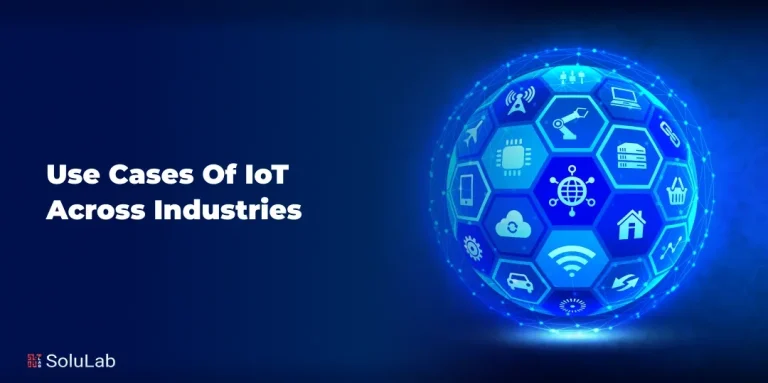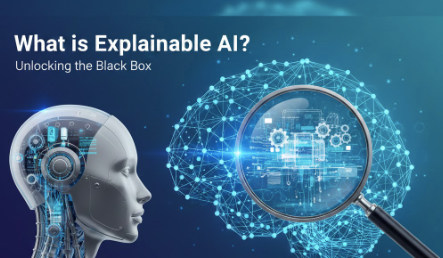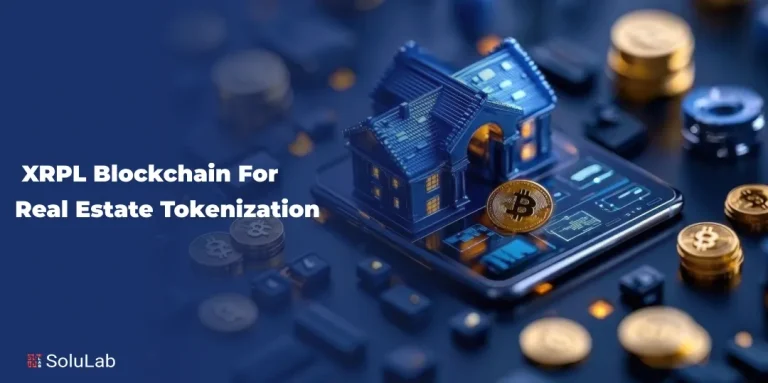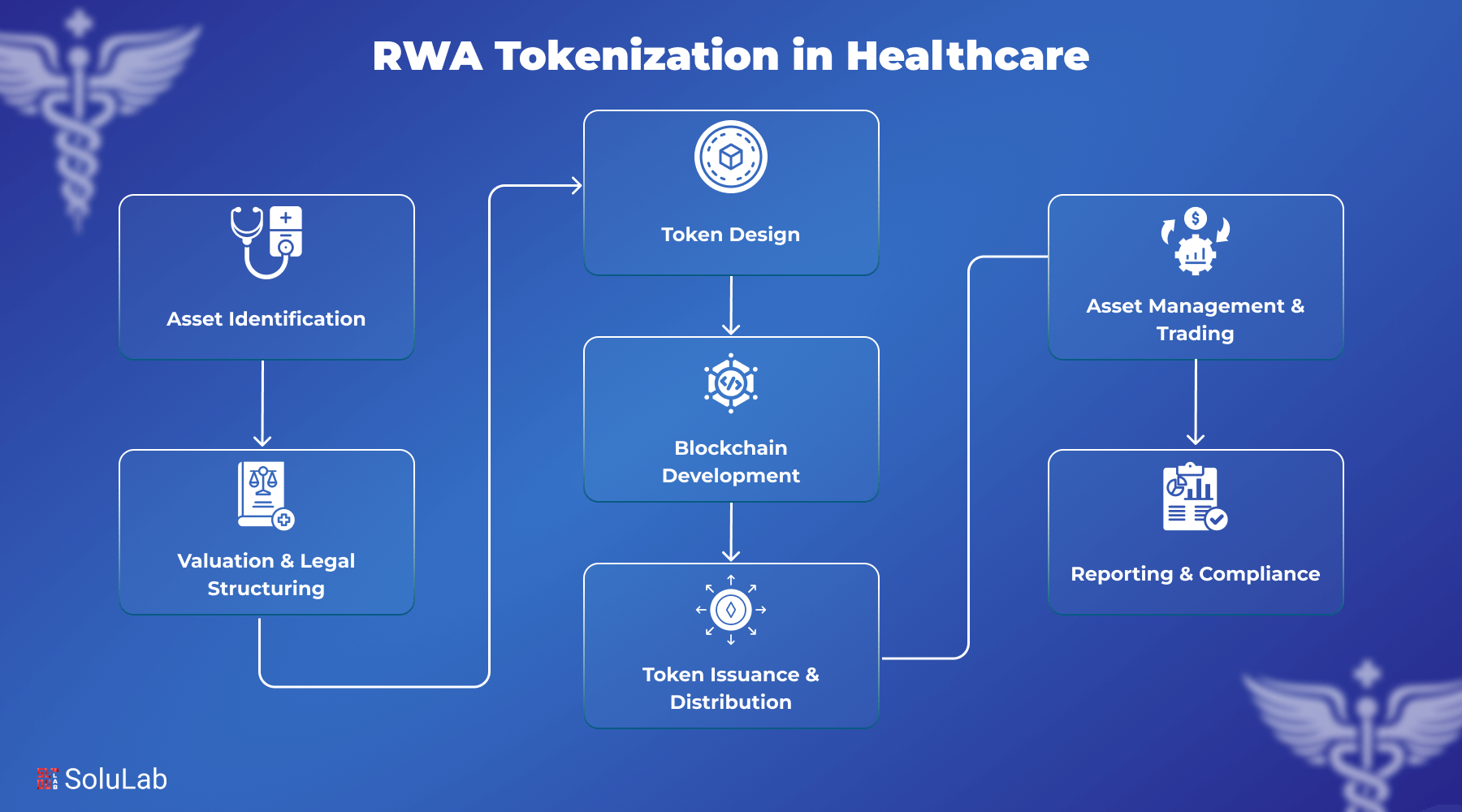
The global healthcare and biotech industries are growing rapidly and are expected to reach over $10 trillion by 2025. Yet, they still rely on outdated systems to manage medical records, clinical trial data, and pharmaceutical supply chains. This leads to billions lost each year due to data breaches, inefficiencies, and fraud.
That’s where RWA Tokenization in Healthcare comes in, a breakthrough method that turns physical or digital healthcare assets into secure, tradable tokens using blockchain technology. These digital health tokens help organizations share data safely, manage assets more efficiently, and build trust across the entire healthcare ecosystem.
By using Healthcare Tokenization, hospitals, researchers, and biotech firms can unlock faster operations, improved patient outcomes, and new investment opportunities, all backed by transparent and secure digital infrastructure.
What is RWA Tokenization in Healthcare?
RWA Tokenization in Healthcare is becoming a game-changer for healthcare and biotech. It works by turning physical or digital health-related assets like medical records, lab results, and drug inventories into secure digital tokens using blockchain technology.
Tokenized healthcare assets are stored on a decentralized system, making them easy to track, share, and manage. This process brings more transparency, security, and efficiency to how sensitive medical data and assets are handled.
Tokenization in Healthcare includes both physical and digital items like patient health records, medical images, genetic data, and pharmaceutical stocks. Tokenized healthcare assets mean turning them into digital tokens that can be safely stored, shared, and managed on a blockchain platform. This process helps make healthcare data more secure and easier to access.
Why Healthcare and Biotech Need New Solutions?
The healthcare industry is full of outdated systems and slow processes. From disconnected data to delays in clinical trials and poor tracking of medicine, traditional systems cause major problems. On top of that, patient privacy and data security are often at risk.
Healthcare Tokenization solutions offer a fix. It creates a secure and unchangeable digital record that can be trusted by all parties, like doctors, patients, researchers, and regulators.
How Blockchain Technology Improves Access to Assets?
With blockchain technology, RWA tokenization connects physical healthcare assets to the digital world. Hospitals, labs, and research teams can instantly access and share data when needed. Asset tokenization development helps improve patient outcomes, speeds up medical research, and reduces paperwork.
The result is a smarter, more patient-focused system that runs faster, costs less, and builds more trust.
How Asset Tokenization Applies to Medical Data?
By using healthcare data tokenization, hospitals and labs can securely manage sensitive records. For example, patient consent forms can be tokenized to track approvals clearly, and clinical trial data can be shared securely between researchers, improving teamwork and speeding up medical discoveries.
The Difference Between Utility Tokens vs Asset-Backed Tokens?
In healthcare, utility tokens give access to certain services, like telemedicine or health tracking apps. On the other hand, asset-backed tokens represent real ownership, such as shares in a biotech firm or rights to a medical patent. Knowing the difference helps patients, doctors, and investors work better with blockchain consulting companies.
Non-fungible tokens in healthcare are another type, used for unique medical items like individual test results or genetic profiles.
| Feature | Utility Tokens | Asset-Backed Tokens |
| Definition | Tokens that provide access to services or apps | Tokens that represent ownership of real assets |
| Purpose in Healthcare | Access to telemedicine, health monitoring tools, or platforms | Ownership of shares in biotech companies, patents, or physical healthcare assets |
| Value Basis | Value depends on usefulness within a platform | Value tied to the underlying real-world asset |
| Transferability | Usually transferable within a specific network | Can represent tradable ownership, often regulated |
| Regulatory Impact | Typically, fewer regulations, considered a utility | Often subject to securities laws and stricter compliance |
| Role in blockchain consulting companies | Used to build apps or platforms enhancing healthcare services | Used to enable investment and ownership opportunities in healthcare assets |
| Examples | Access tokens for a patient engagement app | Tokenized shares in a biotech research project |
Why the Healthcare Sector Needs RWA Tokenization?
The healthcare industry is one of the most asset-intensive sectors, dealing with everything from medical equipment and infrastructure to intellectual property and research data. These assets are often illiquid, underutilized, and difficult to transfer or finance. RWA tokenization offers a transformative solution by converting these physical and digital assets into blockchain-based tokens, making them easily tradable, divisible, and accessible in real-time.
-
Data Privacy and Ownership
Traditional centralized data systems are often at risk of hacks and leaks. Using Healthcare Tokenization creates a decentralized system, giving patients full control over who can see their data while following important rules like HIPAA and GDPR.
-
Transparent and Decentralized Clinical Trials
Clinical trials can be slow and unclear. With Tokenization in Healthcare, trial information, researchers create records that cannot be changed, building trust and allowing live updates. This method supports the work of blockchain development companies aiming to improve how clinical research works.
If you want to see exactly how blockchain can improve the quality and transparency of clinical trials, check out this case study
-
Empowering Patients with Control Over Their Data
With tokenization, patients own their health information and decide who can use it. Smart contracts allow patients to easily share or block access, making healthcare more focused on the individual.
-
New Research and Biotech Funding
With RWA asset tokenization, biotech companies can break large assets into smaller, affordable pieces. This opens up new ways to support research and matches the goals of leading blockchain development companies in healthcare.
How RWA Tokenization is Solving Healthcare Challenges?
The healthcare industry faces several critical challenges– funding gaps, inefficient asset utilization, complex billing systems, and a lack of transparency in supply chains. Real-World Asset (RWA) tokenization is emerging as a powerful solution to address these issues head-on.

1. Protecting Patient Data at Scale
As more health records go digital, protecting patient information becomes crucial. Blockchain technology offers strong security with end-to-end encryption and unchangeable records. This keeps data safe from hacks and unauthorized changes.
2. Secure and Seamless Data Sharing
Healthcare data tokenization makes it easier and safer for hospitals, labs, and insurers to share data. Using blockchain platforms, everyone involved can access up-to-date information instantly, which helps improve patient care and teamwork.
3. Tokenized Insurance Claims
Smart contracts on the blockchain automate insurance claim processes. This cuts down paperwork, speeds up payments, and reduces errors. It shows how blockchain development companies are making healthcare more efficient.
4. Remote and Cross-Border Health Systems
Tokenization helps build health systems that work together across different regions and countries. This smooth data exchange supports telemedicine and global healthcare programs, making care more accessible everywhere.
Read More: Why Is Real-World Asset Tokenization Gaining Global Popularity?
Blockchain Infrastructure in Healthcare
The healthcare sector demands high levels of data security, interoperability, and transparency. Blockchain infrastructure offers a decentralized and tamper-proof foundation.
1. Role of Smart Contracts
Smart contracts are self-executing agreements coded on a blockchain platform. In healthcare, they automate many important tasks, such as:
- Patient consent management: Automatically recording and verifying patient permissions to use their data, ensuring privacy and legal compliance.
- Billing and payments: Streamlining insurance claims and billing processes by automatically triggering payments when conditions are met.
- Medical supply tracking: Automatically updating the status of pharmaceutical shipments or equipment, reducing errors and fraud.
This automation reduces human errors, speeds up healthcare workflows, and increases overall operational efficiency. By removing manual tasks, smart contracts make healthcare systems more reliable and transparent.
2. Integration with Legacy Health IT
Healthcare organizations already use various IT systems, like electronic health records (EHRs) and hospital management software. Integrating blockchain technology into these existing systems requires:
- Careful planning: To avoid disrupting daily operations, blockchain solutions must be compatible with current software and hardware.
- Data interoperability: Ensuring that blockchain platforms can communicate and exchange information smoothly with legacy systems.
- Scalable design: Building blockchain infrastructure that can grow with the healthcare provider’s needs without performance loss.
Blockchain consulting companies play a crucial role here, helping healthcare providers adopt blockchain gradually, minimizing risks, and ensuring seamless transitions.
3. Compliance by Design
Healthcare data is sensitive and heavily regulated by laws like HIPAA (Health Insurance Portability and Accountability Act) and GDPR (General Data Protection Regulation). Blockchain solutions in healthcare must be:
- Secure: Protect patient data with encryption and decentralized storage to prevent breaches.
- Privacy-focused: Allow patients to control who accesses their data through smart contracts and permissioned blockchains.
- Regulation-compliant: Designed from the start (“compliance by design”) to meet all legal requirements, avoiding costly fines and legal challenges.
By embedding compliance in the blockchain system’s architecture, healthcare providers can confidently adopt innovative technologies while protecting patient rights.
Real-World Use Cases of RWA Tokenization in Healthcare
RWA tokenization is already making a tangible impact across various segments of the healthcare industry. Some of the major ones are:
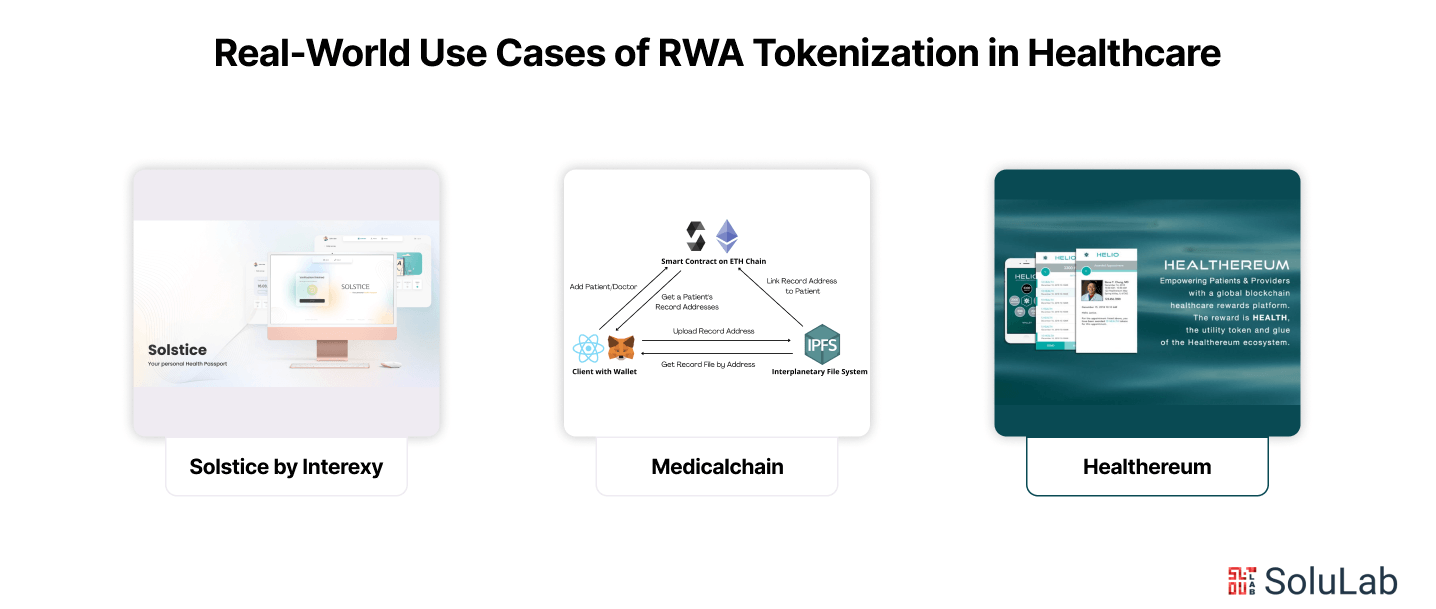
-
Solstice by Interexy
Solstice is a blockchain-based platform designed to protect clinical trial data. By using blockchain technology, Solstice ensures that the data is secure, transparent, and unchangeable. This means researchers and healthcare professionals can trust the information, speeding up drug development and improving patient safety.
-
Medicalchain
Medicalchain offers a secure way to manage electronic health records using blockchain platforms. Patients get more control over their health data, deciding who can see it and when. This reduces data breaches and improves communication between doctors and patients.
-
Healthereum
Healthereum uses token rewards to encourage patients to stay involved in their care. Patients earn tokens by completing health-related tasks like attending appointments or following treatment plans. This approach increases patient engagement and leads to better health outcomes.
How Healthcare RWA Tokenization Works?
Healthcare tokenization involves converting real-world healthcare assets, such as medical equipment, patient invoices, clinical trial data, or even hospital infrastructure, into digital tokens on a blockchain. Here’s a simplified breakdown of how it works:
-
Asset Digitization Process
In Healthcare Tokenization, medical records, lab results, or medical devices are converted into digital tokens. These tokens are then stored safely on a blockchain platform, making it easier to track, share, and manage these assets securely.
-
Identity and Access Layers
To keep patient information safe, strong identity checks and access controls are essential. This means only authorized users can view or use sensitive data, protecting privacy and complying with healthcare rules.
-
On-chain vs Off-chain Data Handling
Not all medical data is stored directly on the blockchain:
1. On-chain: Stores important proofs (e.g., verification, timestamps, permissions)
2. Off-chain: Stores large files like MRI scans or full medical histories
This hybrid storage keeps the system fast, secure, and scalable. It also cuts down on costs and keeps sensitive data more private.
Future Trends in Healthcare Tokenization
As the healthcare sector embraces digital transformation, asset tokenization is set to play a pivotal role in future innovations. We can expect to see the rise of:
-
AI-Driven Token Utility
Combining artificial intelligence (AI) with tokenized healthcare data can improve how we analyze health information. AI can help predict diseases, personalize treatments, and support medical research faster and more accurately.
-
Tokenized Healthcare Equity
RWA Tokenization in Healthcare allows investors to buy small shares of healthcare assets, such as biotech companies or medical patents. This fractional ownership opens new funding opportunities and helps fuel healthcare innovation.
-
Decentralized Health Marketplaces
New platforms are emerging where patients can securely share and even sell their health data in decentralized marketplaces. This empowers patients to control their information and benefit financially if they choose to share it.
Conclusion
Healthcare Tokenization is changing the way we handle medical data and assets. It creates more secure, efficient, and patient-focused healthcare systems. By using blockchain technology, the industry can solve problems like data silos, privacy concerns, and funding challenges. Working with expert blockchain consulting companies is key to successfully adopting these innovations.
If you’re looking to build custom Healthcare Tokenization Solutions or need guidance on healthcare blockchain solutions, SoluLab, a top asset tokenization development company in the USA, can help. The team of experts is backed by years of experience and technical expertise to render the best solutions that boost your business operations as well as ROI.
Contact us to explore how we can support your unique projects and drive growth!
FAQs
1. What are the potential use cases of tokenization in biotech?
In biotech, tokenization can be used to fund drug development, tokenize clinical trial rights, license intellectual property, or even fractionalize ownership of research outcomes.
2. Can small clinics or biotech startups use tokenization?
Absolutely. Tokenization levels the playing field by allowing smaller players to access capital markets, attract global investors, and finance innovation without traditional institutional barriers.
3. How long does it take to develop and deploy a tokenization platform?
A basic platform can take 2–3 months, while more complex, compliant solutions may require 4–6 months or longer, especially when dealing with healthcare regulations and investor features.
4. Can I tokenize a single medical asset or do I need a portfolio?
Both are possible. You can tokenize a single high-value asset (like a research patent or imaging device) or a bundle of assets for portfolio-based investments. Tokenization can scale based on your business model.
5. How do I get started with SoluLab for healthcare tokenization?
Getting started is simple! Schedule a free consultation with our blockchain experts and share your business goals and asset types to be tokenized. We’ll propose a custom roadmap, including cost estimate, timelines, and tech stack. Once approved, our team begins.



